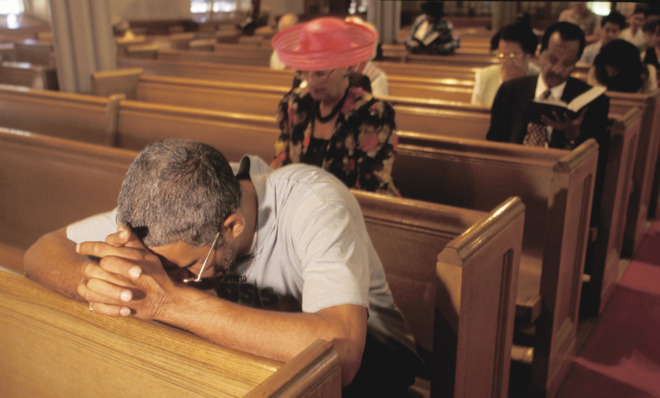Is secularism inevitable?
Many believe secularism goes hand in hand with modernity. But our capacity for religious enchantment is as strong as ever.


A free daily email with the biggest news stories of the day – and the best features from TheWeek.com
You are now subscribed
Your newsletter sign-up was successful
For a long time, sociologists and social theorists assumed that modernity inevitably leads to secularization. If the United States remained religious, that was because it was less modern than its more thoroughly disenchanted European cousins. But America was bound to catch up, sooner or later.
In recent decades, the academic consensus in favor of inevitable secularization has begun to break down. But that hasn't stopped some writers — including those who express considerable sympathy for faith — from doubling down on the secularization thesis.
Canadian philosopher Charles Taylor may be the most intellectually formidable of these.
The Week
Escape your echo chamber. Get the facts behind the news, plus analysis from multiple perspectives.

Sign up for The Week's Free Newsletters
From our morning news briefing to a weekly Good News Newsletter, get the best of The Week delivered directly to your inbox.
From our morning news briefing to a weekly Good News Newsletter, get the best of The Week delivered directly to your inbox.
As Ross Douthat of The New York Times notes in a lengthy blog post titled "Religious Experience and the Modern Self," Taylor asks his readers to ponder whether secularism is a matter of individual beliefs about God and the world, or if it represents a more fundamental shift in the social world we all share. Taylor takes the second view, arguing that in some important sense late modernity is essentially secular in orientation, meaning that late modern people simply can't experience the world as enchanted in the way that earlier modern, and especially premodern, people could and did all the time.
To appropriate a line that the scholar of Jewish mysticism Gershom Scholem used to describe literary theorist Walter Benjamin, modern men and women are marooned in the realm of the profane.
Except that they're not.
Yes, modernity (especially liberal modernity) makes things difficult (perhaps uniquely difficult) for people of faith. It fosters a pluralism that denies any one religion the power to organize the whole of social life. It teaches that public authorities must submit to the consent of those over whom they aspire to rule, thereby undermining the legitimacy of all forms of absolutism. It employs the systematic skepticism of the scientific method to settle important questions of public policy. It encourages the growth of the capitalist marketplace, which unleashes human appetites and gives individuals the freedom to choose among an ever-expanding range of ways to satisfy them.
A free daily email with the biggest news stories of the day – and the best features from TheWeek.com
But none of this is incompatible with individuals continuing to have divine experiences — which many millions of modern people clearly do.
Historical epochs or eras don't have homogeneous essences, making them either enchanted or disenchanted. Lots of people in the modern West are thoroughly secular in orientation, but many more aren't. Just visit a Pentecostal church service on a Sunday morning. Or ask a Mormon for testimony of her personal revelations. Or pray with the congregants of an African Methodist Episcopal church. Or talk to an ultra-orthodox rabbi. Or peek into an orthodox Catholic Church during Easter Vigil Mass. Or read anthropologist T.M. Luhrmann's important book about evangelical piety. Our shared social world is enchanted for some and disenchanted for others. And America's thriving culture of conversion shows that many people can and do readily move from one camp into the other. When they do, they are not moving into and out of modernity; they are moving back and forth between enchanted and disenchanted forms of modernity.
Taylor is a very smart man, but he's wrong — I'd say obviously wrong — about modern secularity. His philosophy of modern disenchantment appeals mainly to intellectuals and academics who pine for a religious experience they can't quite seem to achieve. Taylor tells such people that their absence of faith isn't because of anything about them personally — that it isn't the result of individual skepticism or pride or a refusal to open themselves up to God. Taylor tells them, instead, that it's the inevitable condition of Life in Our Time.
But it isn't.
Damon Linker is a senior correspondent at TheWeek.com. He is also a former contributing editor at The New Republic and the author of The Theocons and The Religious Test.
-
 Health insurance: Premiums soar as ACA subsidies end
Health insurance: Premiums soar as ACA subsidies endFeature 1.4 million people have dropped coverage
-
 Anthropic: AI triggers the ‘SaaSpocalypse’
Anthropic: AI triggers the ‘SaaSpocalypse’Feature A grim reaper for software services?
-
 NIH director Bhattacharya tapped as acting CDC head
NIH director Bhattacharya tapped as acting CDC headSpeed Read Jay Bhattacharya, a critic of the CDC’s Covid-19 response, will now lead the Centers for Disease Control and Prevention
